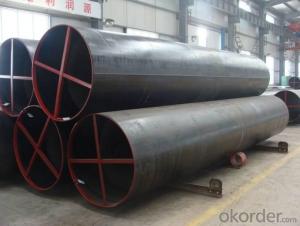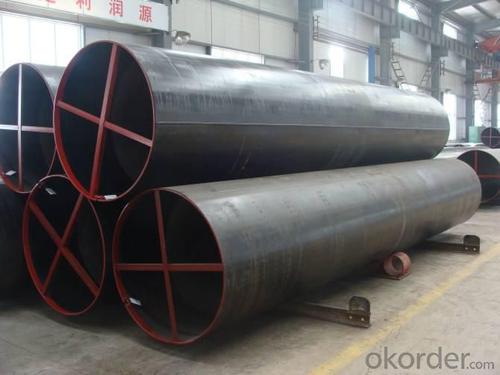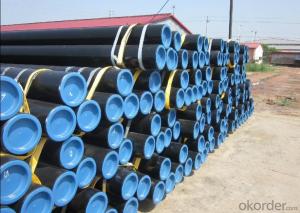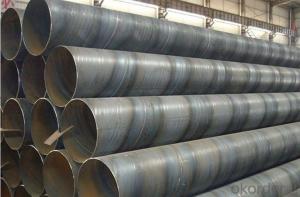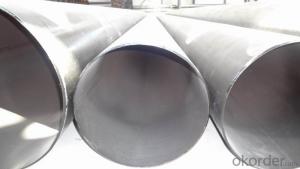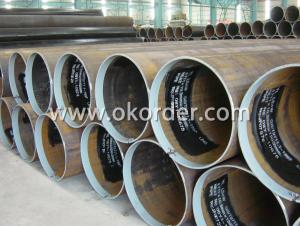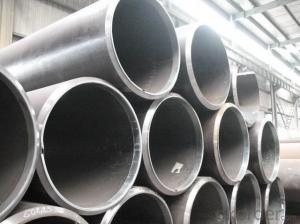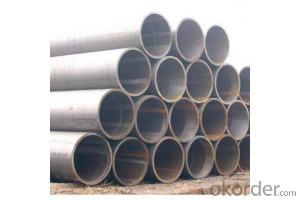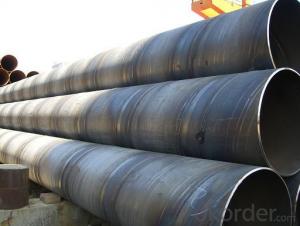API PSL2 LSAW STEEL PIPE
- Loading Port:
- China Main Port
- Payment Terms:
- TT OR LC
- Min Order Qty:
- -
- Supply Capability:
- -
OKorder Service Pledge
OKorder Financial Service
You Might Also Like
LSAW Steel Pipe
1 Size: 219-3200 mm*5-25.4mm
2 Material Q235/Q345/20#/X42-X65/J55 etc
Standard:
EN-10208-1/2, GB9711.1/2 etc.
Steel Grade:
B, X42 up to X70; L245, L290 up to L48
Usage:
Used for Steel Structure
Size:
LSAW from 219.1mm to 3200mm, thickness from 5mm to 25.4mm
Ends: Beveled ends with protector
Surface:
Bare / Varnish coating / FBE, 3PE coating DIN30670 / or by client option
Packing:
Casing, bundled shipping in containers or by break bulk vessel
Process | Longitudinal Submerged- Arc Welded Steel Pipe (DSAW -Double Submerged arc welded) |
Usage | Used for liquid delivery, such as water, gas, and oil; construction and piling |
Standard | API 5L(PSL1,PSL2), ASTM A252,EN10217, EN10219,KS F4602, KS D3583, BS, JIS, IS |
Certificate | ISO 9001:2008, ISO 14001, ISO 18001, API 5L (PSL1, PSL2),EN10217, EN10219 and so on. |
Outside Diameter | 323.9 mm-2134 mm (12"-84") |
Wall Thickness | 6 mm - 80mm |
Length | 6 – 14 m |
Grade | API 5L: GR A, GR B, X42,X46, X56, X60,X65,X70 ASTM A252 GR 1, GR 2, GR 3 EN 10219: S275, S275JR, S355JRH, S355J2H EN 10224, L235,L275,L355 |
Surface | Fusion bond Epoxy coating, Coal Tar Epoxy, 3PE, Varnish Coating, Bitumen Coating, Black Oil coating as per customer’s requirement |
Test | Chemical Component Analysis, Mechanical Properties (Tensile strength, Yield strength, Elongation), Hydrostatic Test, X-ray Test,Size Inspection. |
Mill Test Certificate | Mill Test Certificate:EN 10204/3.1B |
- Q: What is the role of steel pipes in the construction of stadiums?
- Steel pipes play a crucial role in the construction of stadiums as they are used for various purposes such as structural support, framing, and the creation of plumbing and drainage systems. These pipes provide the necessary strength and durability required to withstand heavy loads, ensuring the overall stability and safety of the stadium structure. Additionally, steel pipes are also used for the installation of HVAC systems, electrical wiring, and other infrastructure components, making them an essential element in the construction process.
- Q: Can steel pipes be used for the construction of offshore platforms?
- Yes, steel pipes can be used for the construction of offshore platforms. Steel pipes are commonly used in offshore construction due to their high strength, durability, and resistance to corrosion in harsh marine environments. They are suitable for various applications, including the fabrication of jacket legs, risers, pile sleeves, and other structural components necessary for offshore platform construction.
- Q: How are steel pipes graded?
- Steel pipes are graded based on several factors to determine their quality and suitability for specific applications. The grading system for steel pipes typically includes parameters such as the chemical composition, mechanical properties, manufacturing method, and testing standards. 1. Chemical composition: Steel pipes are graded based on the elements present in their composition. This includes the amount of carbon, manganese, phosphorus, sulfur, and other alloying elements. The chemical composition greatly influences the pipe's strength, corrosion resistance, and other properties. 2. Mechanical properties: The mechanical properties of steel pipes are crucial for determining their strength, flexibility, and resistance to pressure and temperature. These properties include tensile strength, yield strength, elongation, hardness, and impact toughness. Pipes with higher mechanical properties are generally graded higher. 3. Manufacturing method: Steel pipes can be manufactured using various methods, such as seamless, welded, or ERW (Electric Resistance Welding). The manufacturing method affects the pipe's integrity, dimensional accuracy, and overall quality. Seamless pipes, for example, are considered to have higher quality due to their uniformity and absence of weld seams. 4. Testing standards: Steel pipes are graded based on their adherence to specific testing standards. These standards ensure that the pipes meet the required quality criteria and are suitable for their intended applications. Common testing standards include ASTM (American Society for Testing and Materials), API (American Petroleum Institute), and EN (European Norms). Based on these factors, steel pipes are often graded using alphanumeric codes or specifications. For instance, pipes used in oil and gas industry may be graded as API 5L (American Petroleum Institute) or pipes used for structural purposes may be graded as ASTM A500 (American Society for Testing and Materials). In conclusion, steel pipes are graded based on their chemical composition, mechanical properties, manufacturing method, and adherence to testing standards. These grades help customers and manufacturers in selecting the appropriate pipes for specific applications, ensuring safety, durability, and efficiency in various industries.
- Q: What are the different types of steel pipe coatings for underground gas pipelines?
- There are several different types of steel pipe coatings used for underground gas pipelines. These include fusion bonded epoxy (FBE) coatings, three-layer polyethylene (3LPE) coatings, polyurethane (PU) coatings, and coal tar enamel (CTE) coatings. Each of these coatings provides different levels of corrosion protection and suitability for specific environmental conditions.
- Q: Are steel pipes suitable for use in sewage treatment plants?
- Yes, steel pipes are suitable for use in sewage treatment plants. Steel pipes are durable, corrosion-resistant, and can withstand high-pressure applications, making them an ideal choice for transporting and containing sewage in treatment plants. Additionally, steel pipes can be easily welded, allowing for seamless connections and minimizing the risk of leaks or contamination.
- Q: How do you clean and maintain steel pipes?
- To clean and maintain steel pipes, start by removing any dirt, dust, or debris using a soft cloth or brush. Then, use a mild detergent mixed with water to wash the pipes thoroughly. Rinse them with clean water and dry them completely to prevent rusting. Regularly inspect for any signs of corrosion or damage, and promptly address any issues. Applying a rust-resistant coating can also help in maintaining the pipes' longevity.
- Q: Can steel pipes be used for desalination plants?
- Yes, steel pipes can be used for desalination plants. Steel pipes are commonly used in desalination plants for transporting seawater, brine, and treated water due to their high strength, durability, and resistance to corrosion. They can withstand the harsh conditions and corrosive nature of saltwater, making them a suitable choice for the construction and operation of desalination plants.
- Q: What is an electric welded pipe (EFW)? Seek help!
- Pipe and pipe fittings should be suitable for the gap, usually with micro force insertion is appropriate, the gap is too large or too small will affect the quality of the interface.Check the depth of the plug and slip the spigot into the socket and position correctly.
- Q: What is the outer diameter of the steel tube?
- The outer diameter refers to the maximum diameter including the thickness of the steel tube, the inner diameter is the length of the hollow part inside, and the outer diameter minus the inside diameter is the thickness of the steel pipe
- Q: Can steel pipes be used for nuclear power plants?
- Yes, steel pipes can be used for nuclear power plants. Steel pipes are commonly used for various applications in nuclear power plants, such as transporting coolant, steam, and other fluids. They are selected based on their ability to withstand high temperatures, pressures, and corrosive environments. However, specific requirements and regulations related to nuclear safety and radiation protection must be strictly followed during the design, fabrication, and installation of steel pipes in nuclear power plants.
Send your message to us
API PSL2 LSAW STEEL PIPE
- Loading Port:
- China Main Port
- Payment Terms:
- TT OR LC
- Min Order Qty:
- -
- Supply Capability:
- -
OKorder Service Pledge
OKorder Financial Service
Similar products
Hot products
Hot Searches
Related keywords
